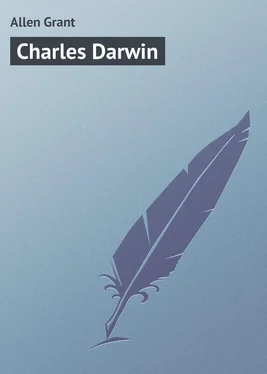Grant Allen - Charles Darwin
Здесь есть возможность читать онлайн «Grant Allen - Charles Darwin» — ознакомительный отрывок электронной книги совершенно бесплатно, а после прочтения отрывка купить полную версию. В некоторых случаях можно слушать аудио, скачать через торрент в формате fb2 и присутствует краткое содержание. Жанр: foreign_prose, на английском языке. Описание произведения, (предисловие) а так же отзывы посетителей доступны на портале библиотеки ЛибКат.
- Название:Charles Darwin
- Автор:
- Жанр:
- Год:неизвестен
- ISBN:нет данных
- Рейтинг книги:4 / 5. Голосов: 1
-
Избранное:Добавить в избранное
- Отзывы:
-
Ваша оценка:
- 80
- 1
- 2
- 3
- 4
- 5
Charles Darwin: краткое содержание, описание и аннотация
Предлагаем к чтению аннотацию, описание, краткое содержание или предисловие (зависит от того, что написал сам автор книги «Charles Darwin»). Если вы не нашли необходимую информацию о книге — напишите в комментариях, мы постараемся отыскать её.
Charles Darwin — читать онлайн ознакомительный отрывок
Ниже представлен текст книги, разбитый по страницам. Система сохранения места последней прочитанной страницы, позволяет с удобством читать онлайн бесплатно книгу «Charles Darwin», без необходимости каждый раз заново искать на чём Вы остановились. Поставьте закладку, и сможете в любой момент перейти на страницу, на которой закончили чтение.
Интервал:
Закладка:
That long five years' cruise around the world, the journal of which Darwin has left us in the 'Voyage of the "Beagle,"' proved a marvellous epoch in the great naturalist's quiet career. It left its abiding mark deeply imprinted on all his subsequent life and thinking. Lamarck and Erasmus Darwin were cabinet biologists, who had never beheld with their own eyes the great round world and all that therein is; Charles Darwin had the inestimable privilege of seeing for himself, at first hand, a large part of the entire globe and of the creatures that inhabit it. Even to have caught one passing glimpse of the teeming life of the tropics is in itself an education; to the naturalist it is more, it is a revelation. Our starved little northern fauna and flora, the mere leavings of the vast ice sheets that spread across our zone in the glacial epoch, show us a world depopulated of all its largest, strangest, and fiercest creatures; a world dwarfed in all its component elements, and immensely differing in ten thousand ways from that rich, luxuriant, over-stocked hot-house in which the first great problems of evolution were practically worked out by survival of the fittest. But the tropics preserve for us still in all their jungles something of the tangled, thickly-peopled aspect which our planet must have presented for countless ages in all latitudes before the advent of primæval man. We now know that throughout the greater part of geological time, essentially tropical conditions existed unbroken over the whole surface of the entire earth, from the Antarctic continent to the shores of Greenland; so that some immediate acquaintance at least with the equatorial world is of immense value to the philosophical naturalist for the sake of the analogies it inevitably suggests; and it is a significant fact that almost all those great and fruitful thinkers who in our own time have done good work in the wider combination of biological facts have themselves passed a considerable number of years in investigating the conditions of tropical nature. Europe and England are at the ends of the earth; the tropics are biological head-quarters. The equatorial zone is therefore the true school for the historian of life in its more universal and lasting aspects.
Nor was that all. The particular countries visited by the 'Beagle' during the course of her long and varied cruise happened to be exactly such as were naturally best adapted for bringing out the latent potentialities of Darwin's mind, and suggesting to his active and receptive brain those deep problems of life and its environment which he afterwards wrought out with such subtle skill and such consummate patience in the 'Origin of Species' and the 'Descent of Man.' The Cape de Verdes, and the other Atlantic islands, with their scanty population of plants and animals, composed for the most part of waifs and strays drifted to their barren rocks by ocean currents, or blown out helplessly to sea by heavy winds; Brazil, with its marvellous contrasting wealth of tropical luxuriance and self-strangling fertility, a new province of interminable delights to the soul of the enthusiastic young collector; the South American pampas, with their colossal remains of extinct animals, huge geological precursors of the stunted modern sloths and armadillos that still inhabit the self-same plains; Tierra del Fuego, with its almost Arctic climate, and its glimpses into the secrets of the most degraded savage types; the vast range of the Andes and the Cordilleras, with their volcanic energy and their closely crowded horizontal belts of climatic life; the South Sea Islands, those paradises of the Pacific, Hesperian fables true, alike for the lover of the picturesque and the biological student; Australia, that surviving fragment of an extinct world, with an antiquated fauna whose archaic character still closely recalls the European life of ten million years back in the secondary epoch: all these and many others equally novel and equally instructive passed in long alternating panorama before Darwin's eyes, and left their images deeply photographed for ever after on the lasting tablets of his retentive memory. That was the real great university in which he studied nature and read for his degree. Our evolutionist was now being educated.
Throughout the whole of the journal of this long cruise, which Darwin afterwards published in an enlarged form, it is impossible not to be struck at every turn with the way in which his inquisitive mind again and again recurs to the prime elements of those great problems towards whose solution he afterwards so successfully pointed out the path. The Darwinian ideas are all already there in the germ; the embryo form of the 'Origin of Species' plays in and out on every page with the quaintest elusiveness. We are always just on the very point of catching it; and every now and again we do actually all but catch it in essence and spirit, though ever still its bodily shape persistently evades us. Questions of geographical distribution, of geological continuity, of the influence of climate, of the modifiability of instinct, of the effects of surrounding conditions, absorb the young observer's vivid interest at every step, wherever he lands. He is all unconsciously collecting notes and materials in profuse abundance for his great work; he is thinking in rough outline the new thoughts which are hereafter to revolutionise the thought of humanity.
Five years are a great slice out of a man's life: those five years of ceaseless wandering by sea and land were spent by Charles Darwin in accumulating endless observations and hints for the settlement of the profound fundamental problems in which he was even then so deeply interested. The 'Beagle' sailed from England to the Cape de Verdes, and already, even before she had touched her first land, the young naturalist had observed with interest that the impalpably fine dust which fell on deck contained no less than sixty-seven distinct organic forms, two of them belonging to species peculiar to South America. In some of the dust he found particles of stone so very big that they measured 'above the thousandth of an inch square;' and after this fact, says the keen student, 'one need not be surprised at the diffusion of the far lighter and smaller sporules of cryptogamic plants.' Would Erasmus Darwin have noticed these minute points and their implications one wonders? Probably not. May we not see in the observation partly the hereditary tendencies of Josiah Wedgwood towards minute investigation and accuracy of detail, partly the influence of the scientific time-wave, and the careful training under Professor Henslow? Erasmus Darwin comes before us rather as the brilliant and ingenious amateur, his grandson Charles as the instructed and fully equipped final product of the scientific schools.
At St. Paul's Rocks, once more, a mass of new volcanic peaks rising abruptly from the midst of the Atlantic, the naturalist of the 'Beagle' notes with interest that feather and dirt-feeding and parasitic insects or spiders are the first inhabitants to take up their quarters on recently formed oceanic islands. This problem of the peopling of new lands, indeed, so closely connected with the evolution of new species, necessarily obtruded itself upon his attention again and again during his five years' cruise; and in some cases, especially that of the Galapagos Islands, the curious insular faunas and floras which he observed upon this trip, composed as they were of mere casual straylings from adjacent shores, produced upon his mind a very deep and lasting impression, whose traces one may without difficulty discern on every second page of the 'Origin of Species.'
On the last day of February, 1832, the 'Beagle' came to anchor in the harbour of Bahia, and young Darwin caught sight for the first time of the mutually strangling luxuriance of tropical vegetation. Nowhere on earth are the finest conditions of tropical life more fully realised than in the tangled depths of the great uncleared Brazilian forests, which everywhere gird round like a natural palisade with their impenetrable belt the narrow and laborious clearings of over-mastered man. The rich alluvial silt of mighty river systems, the immemorial manuring of the virgin soil, the fierce energy of an almost equatorial sun, and the universal presence of abundant water, combine to make life in that marvellous region unusually wealthy, varied, and crowded, so that the struggle for existence is there perhaps more directly visible to the seeing eye than in any other known portion of God's universe. 'Delight itself,' says Darwin in his journal, with that naive simplicity which everywhere forms the chief charm of his direct and unaffected literary style – 'delight itself is a weak term to express the feelings of a naturalist who for the first time has wandered by himself in a Brazilian forest. The elegance of the grasses, the novelty of the parasitical plants, the beauty of the flowers, the glossy green of the foliage, but above all the general luxuriance of the vegetation, filled me with admiration.' In truth, among those huge buttressed trunks, overhung by the unbroken canopy of foliage on the vast spreading and interlacing branches, festooned with lianas and drooping lichens, or beautified by the pendent alien growth of perfumed orchids, Darwin's mind must indeed have found congenial food for apt reflection, and infinite opportunities for inference and induction. Prom the mere picturesque point of view, indeed, the naturalist enjoys such sights as this a thousand times more truly and profoundly than the mere casual unskilled observer: for it is a shallow, self-flattering mistake of vulgar and narrow minds to suppose that fuller knowledge and clearer insight can destroy or impair the beauty of beautiful objects – as who should imagine that a great painter appreciates the sunset less than a silly boy or a sentimental schoolgirl. As a matter of fact, the naturalist knows and admires a thousand exquisite points of detail in every flower and every insect which only he himself and the true artist can equally delight in. And a keen intellectual and æsthetic joy in the glorious fecundity and loveliness of nature was everywhere present to Darwin's mind. But, beyond and above even that, there was also the architectonic delight of the great organiser in the presence of a noble organised product: the peculiar pleasure felt only by the man in whose broader soul all minor details fall at once into their proper place, as component elements in one great consistent and harmonious whole – a sympathetic pleasure akin to that with which an architect views the interior of Ely and of Lincoln, or a musician listens to the linked harmonies of the 'Messiah' and the 'Creation.' The scheme of nature was now unfolding itself visibly and clearly before Charles Darwin's very eyes.
Читать дальшеИнтервал:
Закладка:
Похожие книги на «Charles Darwin»
Представляем Вашему вниманию похожие книги на «Charles Darwin» списком для выбора. Мы отобрали схожую по названию и смыслу литературу в надежде предоставить читателям больше вариантов отыскать новые, интересные, ещё непрочитанные произведения.
Обсуждение, отзывы о книге «Charles Darwin» и просто собственные мнения читателей. Оставьте ваши комментарии, напишите, что Вы думаете о произведении, его смысле или главных героях. Укажите что конкретно понравилось, а что нет, и почему Вы так считаете.












